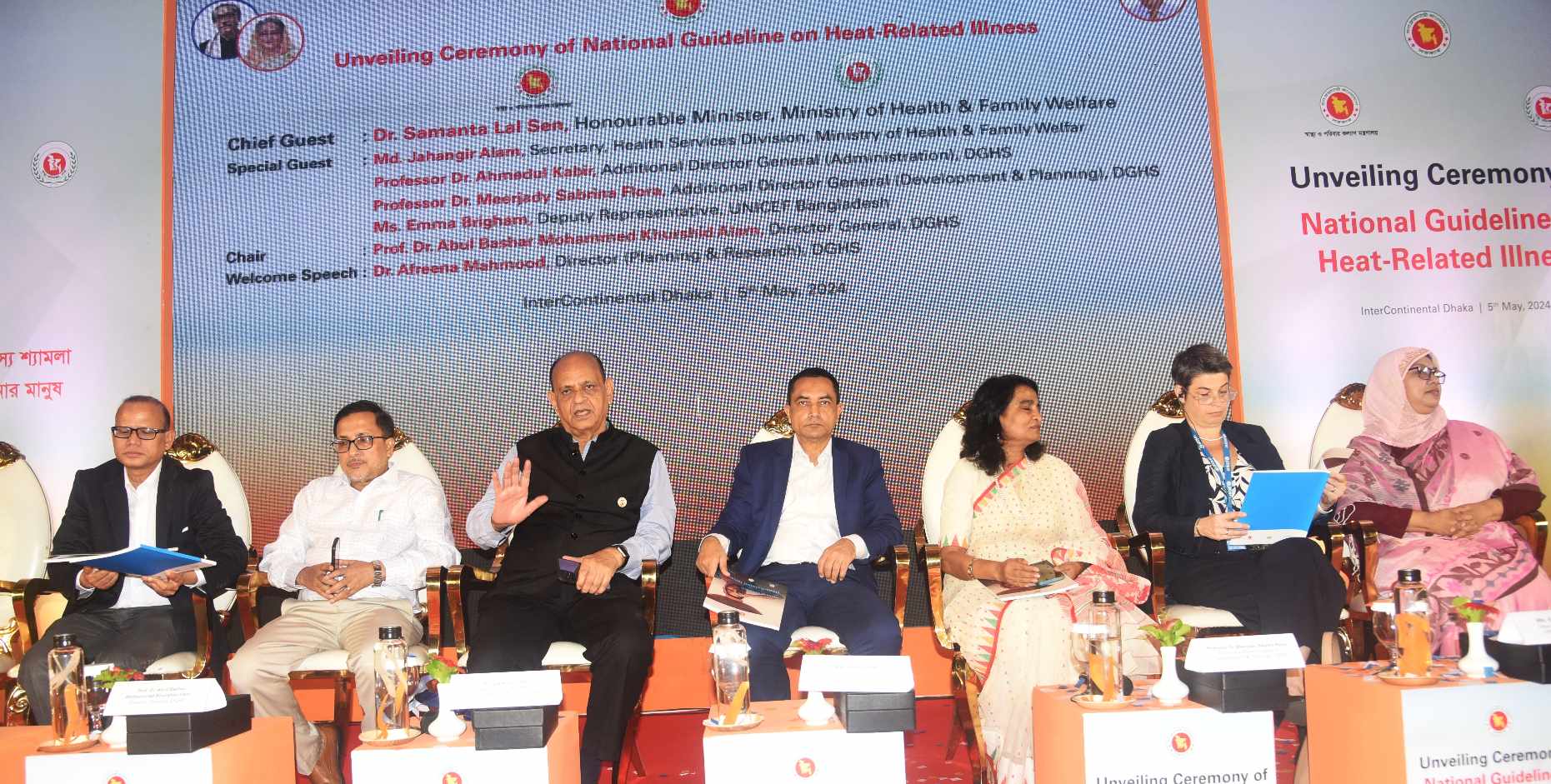
DHAKA, May 5, 2024 (BSS) - Health and Family Welfare Minister Professor Dr Samanta Lal Sen today said the national guidelines on heat-related illness are time-befitting as Bangladesh witnessed extreme and prolonged heatwave since April 1.
"We have to spread the instructions of the guidelines in every corner of the country to protect the people from heatwave-linked diseases," he told the cover unveiling function of the 'National Guidelines on Heat-Related Illnesses' at a city hotel here.
Secretary of the Health Service Division Dr. Jahangir Alam, Additional Director General of the DGHS Mirzadi Sabrina Flora, UNICEF Bangladesh Deputy Representative Emma Brigham, among others, were present at the function with Director General of Directorate General of Health Services (DGHS) Prof Dr Abul Bashar Mohammad Khurshid Alam in the chair.
The health minister said, "Elderly people and children are the most vulnerable due to the ongoing heatwave . . . I am urging the people, particularly old-age and children to stay indoors to avoid heatstroke and other heatwave related complications."
Alongside elderly people and children, people with different chronic diseases including diabetes, hypertension and heart diseases are the most vulnerable for the blistering heatwave, Samanata added.
He said, "We have prepared the guidelines incorporating longtime heatwave impact caused by global climate change. The health ministry has sent the guidelines to public hospitals and taken initiatives to provide trainings for healthcare professionals."
Earlier at a function, Health and Family Welfare Minister Professor Dr Samanta Lal Sen directed authorities concerned of the public hospitals to remain ready for extending healthcare services to people as the country is under the grip of severe heatwave.
He said extreme heatwave has put the country into catastrophic position and authorities of public hospitals already have been asked to keep ready for extending treatment services to the people.
The Directorate General of Health Services (DGHS) in Bangladesh, with UNICEF's support, today launched the National Guidelines on Heat-Related Illnesses to protect children and vulnerable populations, including pregnant women from heat-related health risks, a press release of UNICEF said.
This event marks a critical step in keeping children safe as Bangladesh is increasingly buffeted by the impacts of climate change. In alignment with UNICEF's Healthy Environments for Healthy Children global program framework, launched in 2021, the National Guidelines, jointly developed by DGHS with UNICEF support, underscore the importance of a primary healthcare approach in protecting vulnerable populations from the adverse effects of climate change.
These National Guidelines, developed in collaboration with experts from health and other sectors, provide a comprehensive framework for responding effectively to heat-related health risks.
These risks, according to UNICEF reports, include that the odds of a preterm birth rise by 5 per cent per 1oC increase in temperature, and by 16 per cent during heatwave versus non-heatwave days, demonstrating that the risk of a preterm delivery is higher during a heatwave greater exposure and severity result in greater risk. The preterm birth rate in Bangladesh (16.2%) is the highest in the world and this is further aggravated by heatwaves.
"Every child has the right to a healthy environment, and we all have a role to play. By addressing heat-related illnesses and prioritizing skills for healthcare professionals, we can help pave the way for a healthier and brighter future for children in Bangladesh," emphasized Sheldon Yett, Representative of UNICEF in Bangladesh.
According to recent projections from UNICEF and as a stark reminder of climate change impact, by 2050 a staggering 35.5 million children in Bangladesh, 99 per cent of the total child population at that time, are set to face high heatwave frequency - meaning on average 4.5 or more heatwaves per year.
This will be a significant surge from 2020, when just 2.6 million children, representing 5 per cent, were exposed to such risks.
UNICEF estimates that one in three children in Bangladesh, nearly 20 million children, bear the brunt of climate change every day. Children are victims of extreme weather, such as the current heatwaves, floods, river erosion, sea level rise, and other environmental shocks driven by climate change.
Extreme heat waves have become increasingly prevalent in Bangladesh, posing significant health risks to its population, particularly during the humid months from April to August. UNICEF remains committed to supporting Bangladesh in its efforts to combat climate-related health challenges and looks forward to continued collaboration with DGHS, the Ministries of Education, and other partners in building a resilient and sustainable future for every child.